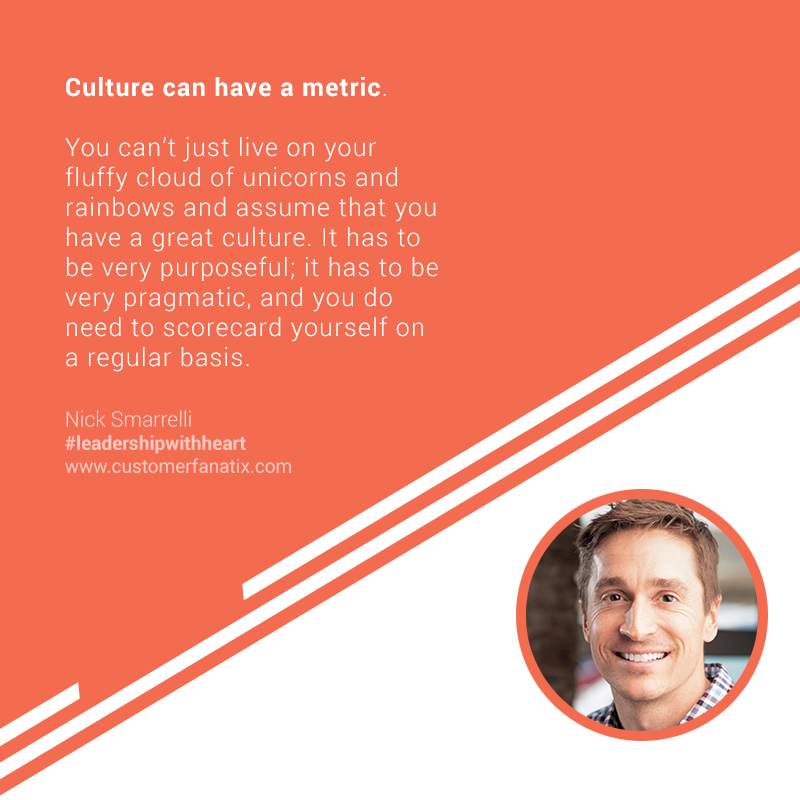Today on the podcast we have Nick Smarrelli, Owner and CEO of GadellNet Technology Solutions. In this episode, we talk about the roots of his leadership, how he merges culture with data and other unique ways that he leads his organization.
The key takeaways in this episode are:
- Culture is meaningless if we do not operationalize who we plan to sustain it
- Culture is not just unicorns and rainbows. We need to scorecard operations
- Watching out for the metrics behind the business can be just as much fun than talking about culture
- In smaller organizations, engaged employees are obvious and slackers cannot hide
- Give people the vocabulary that is acceptable to use when others are not complying with organizational values
- Focus on ways to operationalize values
- Leaders do not have to be the best at everything. Hire for that and admit mistakes along the way
- Leadership is not a destination. Rather, the executives are on a journey with the rest of the team.
This was a great conversation. Nick may join the show again as there was much more to talk about, but time waits for no one.
Nick Smarrelli is the Owner and Chief Executive Officer of GadellNet Technology Solutions. GadellNet has offices in both St. Louis and Indianapolis. GadellNet, a 6-time Inc. 5000 fastest-growing company with nearly 75 employees in the Midwest, is a small business outsourced IT consulting firm.
Nick has a degree in Psychology and a degree in Finance from St. Louis University. He ran National Account sales for Ingersoll Rand before realizing his passion for entrepreneurship in 2010. Nick is an Ironman athlete, ultramarathon runner, father of 2 (though often 3 as him and his wife foster children as well), and has been a featured technology speaker for chambers of commerce, large national associations, national non-profits, and numerous industry technology conventions.
Creating Impact
Nick’s leadership drive came from his parents, which “sounds like an insanely cliché answer.”
I grew up in a world where hard work was forced upon me, this belief that the world is not going to give you everything was ingrained into our soul, that you have to seek it out and find it.
This idea of “I want to create a space where people love to come to work. I want to create a space where I love to come to work.”
I want to help improve people and I want to help create this community where the community that we serve and our employees and our vision – all of these come hand in hand.

Doing that provides my motivation. Now, if we grow, I can help – first it was, I can create a culture with four people. Then I can create a culture of ten. And now we’re a culture of 80-100.
That’s 80-100 people that I get to affect every day, at nine hours/day.
Numbers Don’t Lie
Creating those metrics is fun because you get to see that progression. On the days where it’s tough, on the days where “I wonder if I’m the right person for the job,” you see those metrics in the culture, you see the metrics in the engagement, you see the metrics in the retention.
You see the metrics in terms of participation in after-hours events, or participation in using your pto time. We use TINYpulse or maybe Cheers for Peers, where it’s a kind of acknowledging your team for hard work – seeing that go up on a week, those are the things that drive me and help motivate me through those tougher times, because I want to see this culture come alive.
I think some of those metrics really do help say, “You are making an impact.” You haven’t gotten to the top of the mountain, but you are making an impact. #leadershipwithheart Share on X
Culture is not just unicorns and rainbows. We need to scorecard operations #leadershipwithheart Share on X
In smaller organizations, engaged employees are obvious and slackers cannot hide #leadershipwithheart Share on X
A Culture of Acceptance
As a leader, I’ve become more wise. I realized that sometimes it is OK to have a bad day.
For me, it happens. I can’t even point to a specific event. I’m sure it’d be far more compelling if I could, but it happens. It happens frequently.
If I’m dealing with a complex financial issue, or we have a client that is upset, or I’m dealing with a tough personnel issue – after that meeting, I’m probably not acting the best version of myself.
And I think one of the things that I’m really happy to be in a culture of acceptance is when that happens, we have a culture that even though given my title, I have an entire organization, whatever layer they are in that organization, that is willing to call me out on that fact.
Some people do it with a sense of humor, some people do it with a sense of directness, but regardless, we’ve created a culture that it’s OK to tell the CEO “You’re not acting in accordance to the best version of yourself.”
My responsibility in hearing that is to acknowledge it and say, “I am not, and I apologize for that.”
Leaders do not have to be the best at everything. Hire for that and admit mistakes along the way. #leaderswithheart Share on X
Give people the vocabulary that is acceptable to use when others are not complying with organizational values #communication #leadership Share on X
Mentions
Connect with Nick on LinkedIn
https://www.cheersforpeers.com/
Subscribe, rate and review the podcast on iTunes!
Listen to the podcast on Spotify
